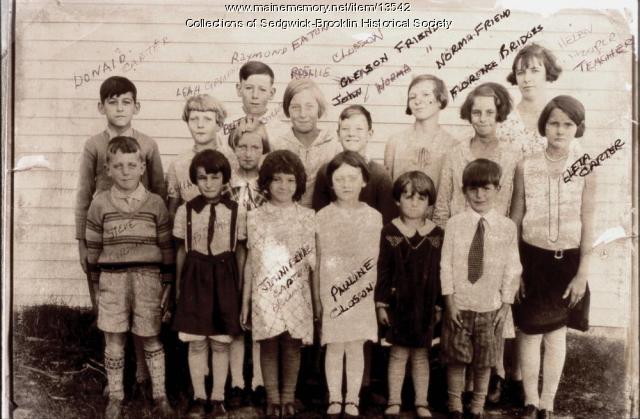Keywords: Ten Mile Falls
- Historical Items (10)
- Tax Records (0)
- Architecture & Landscape (0)
- Online Exhibits (14)
- Site Pages (8)
- My Maine Stories (4)
- Lesson Plans (0)
Online Exhibits
Your results include these online exhibits. You also can view all of the site's exhibits, view a timeline of selected events in Maine History, and learn how to create your own exhibit. See featured exhibits or create your own exhibit
Exhibit
Paper has shaped Maine's economy, molded individual and community identities, and impacted the environment throughout Maine. When Hugh Chisholm opened the Otis Falls Pulp Company in Jay in 1888, the mill was one of the most modern paper-making facilities in the country, and was connected to national and global markets. For the next century, Maine was an international leader in the manufacture of pulp and paper.
Exhibit
Reading, Writing and 'Rithmetic: Brooklin Schools
When Brooklin, located on the Blue Hill Peninsula, was incorporated in 1849, there were ten school districts and nine one-room school houses. As the years went by, population changes affected the location and number of schools in the area. State requirements began to determine ways that student's education would be handled. Regardless, education of the Brooklin students always remained a high priority for the town.
Exhibit
Harry Lyon: An Old Sea Dog Takes to the Air
Through a chance meeting, Harry Lyon of Paris Hill became the navigator on the 1928 flight of the Southern Cross, the first trans-Pacific flight. His skill as a navigator, despite his lack of experience, was a key factor on the flight's success.
Exhibit
Colonial Cartography: The Plymouth Company Maps
The Plymouth Company (1749-1816) managed one of the very early land grants in Maine along the Kennebec River. The maps from the Plymouth Company's collection of records constitute some of the earliest cartographic works of colonial America.
Exhibit
Visitors to the Maine woods in the early twentieth century often recorded their adventures in private diaries or journals and in photographs. Their remembrances of canoeing, camping, hunting and fishing helped equate Maine with wilderness.
Exhibit
Looking Out: Maine's Fire Towers
Maine, the most heavily forested state in the nation, had the first continuously operational fire lookout tower, beginning a system of fire prevention that lasted much of the twentieth century.
Exhibit
Washington County Through Eastern's Eye
Images taken by itinerant photographers for Eastern Illustrating and Publishing Company, a real photo postcard company, provide a unique look at industry, commerce, recreation, tourism, and the communities of Washington County in the early decades of the twentieth century.
Exhibit
Bookplates Honor Annie Louise Cary
A summer resident of Wayne collected more than 3,000 bookplates to honor Maine native and noted opera singer Annie Louise Cary and to support the Cary Memorial Library.
Exhibit
Home Ties: Sebago During the Civil War
Letters to and from Sebago soldiers who served in the Civil War show concern on both sides about farms and other issues at home as well as concern from the home front about soldiers' well-being.
Exhibit
CODE RED: Climate, Justice & Natural History Collections
Explore topics around climate change by reuniting collections from one of the nation's earliest natural history museums, the Portland Society of Natural History. The exhibition focuses on how museums collect, and the role of humans in creating changes in society, climate, and biodiversity.
Exhibit
Maine Eats: the food revolution starts here
From Maine's iconic lobsters, blueberries, potatoes, apples, and maple syrup, to local favorites like poutine, baked beans, red hot dogs, Italian sandwiches, and Whoopie Pies, Maine's identity and economy are inextricably linked to food. Sourcing food, preparing food, and eating food are all part of the heartbeat of Maine's culture and economy. Now, a food revolution is taking us back to our roots in Maine: to the traditional sources, preparation, and pleasures of eating food that have sustained Mainers for millennia.
Exhibit
This Rebellion: Maine and the Civil War
For Mainers like many other people in both the North and the South, the Civil War, which lasted from 1861-1865, had a profound effect on their lives. Letters, artifacts, relics, and other items saved by participants at home and on the battlefield help illuminate the nature of the Civil War experience for Mainers.
Exhibit
Begin Again: reckoning with intolerance in Maine
BEGIN AGAIN explores Maine's historic role, going back 528 years, in crisis that brought about the pandemic, social and economic inequities, and the Black Lives Matter movement in 2020.
Exhibit
The history of the region now known as Maine did not begin at statehood in 1820. What was Maine before it was a state? How did Maine separate from Massachusetts? How has the Maine we experience today been shaped by thousands of years of history?














